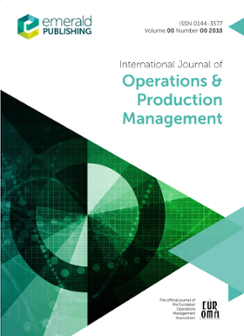绩效衡量和管理在商业生态系统战略制定和实施中的作用
IF 7.4
2区 管理学
Q1 MANAGEMENT
International Journal of Operations & Production Management
Pub Date : 2021-10-15
DOI:10.1108/ijopm-05-2021-0317
引用次数: 10
摘要
目的绩效测量和管理(PMM)系统传统上支持公司内部和跨公司的战略执行。然而,PMM被批评为过于静态和确定性,因此不适用于紧急和动态环境,例如那些具有业务生态系统特征的环境。本研究旨在探讨组织PMM实践在企业生态系统战略发展和实施中的作用。设计/方法/方法作者在2016-2020年期间对一家日本跨国科技公司进行了定性的纵向研究,该公司试图创建一个生态系统战略,以扩大其市场并使其产品多样化。作者收集了访谈、观察和档案资料,涵盖了从制定初步战略到建立生态系统的各个阶段。开发和实施生态系统战略的过程是紧急和高度迭代的,而不是计划和线性的,最终要求公司的关键决策者挑战他们根深蒂固的一些假设。PMM实践首先通过促进对创收的过度关注而成为生态系统发展的障碍。一旦修改,PMM有助于捕获、传达和重新评估生态系统战略。业绩目标、指标和战略地图不仅是数据收集和报告机制,而且是表达相互竞争的观点的关键手段。在制定生态系统战略时,管理者应该采用参与式和迭代式的方法,在不同的时间点回顾各种PMM工具的互补效果。原创性/价值本研究首次对生态系统战略的创建和实施进行了深入研究,并确定了在动态和复杂的背景下,PMM实践的不同作用和影响。本文章由计算机程序翻译,如有差异,请以英文原文为准。
The roles of performance measurement and management in the development and implementation of business ecosystem strategies
PurposePerformance measurement and management (PMM) systems have traditionally enabled strategy execution within and across firms. However, PMM have been criticized as overly static and deterministic and therefore inappropriate for emergent and dynamic contexts, such as those that characterize business ecosystems.The study aims to address the roles of organizational PMM practices in the development and implementation of business ecosystem strategies.Design/methodology/approachThe authors carried out a qualitative, longitudinal study during 2016–2020 at a Japanese multinational technology corporation attempting to create an ecosystem strategy to expand its market and diversify its offering. The authors collected interview, observation and archival data, spanning the period from framing the initial strategy to establishing the ecosystem.FindingsThe process of developing and implementing the ecosystem strategy was emergent and highly iterative, rather than planned and linear, eventually requiring key decision-makers in the company to challenge some of their deeply held assumptions. PMM practices first acted as barriers to ecosystem development by promoting an excessive focus on revenue generation. Once modified, PMM helped capture, convey and reassess the ecosystem strategy. Performance targets, indicators and strategy maps were not just data gathering and reporting mechanisms but key means to express competing perspectives.Practical implicationsWhen developing an ecosystem strategy, managers should adopt a participatory and iterative approach, reviewing the complementary effects of various PMM tools at different points in time.Originality/valueThe study is among the first to provide an in-depth account of ecosystem strategy creation and implementation and to identify the diverse roles and effects of PMM practices in dynamic and complex contexts.
求助全文
通过发布文献求助,成功后即可免费获取论文全文。
去求助
来源期刊
CiteScore
13.30
自引率
17.20%
发文量
96
期刊介绍:
The mission of the International Journal of Operations & Production Management (IJOPM) is to publish cutting-edge, innovative research with the potential to significantly advance the field of Operations and Supply Chain Management, both in theory and practice. Drawing on experiences from manufacturing and service sectors, in both private and public contexts, the journal has earned widespread respect in this complex and increasingly vital area of business management.
Methodologically, IJOPM encompasses a broad spectrum of empirically-based inquiry using suitable research frameworks, as long as they offer generic insights of substantial value to operations and supply chain management. While the journal does not categorically exclude specific empirical methodologies, it does not accept purely mathematical modeling pieces. Regardless of the chosen mode of inquiry or methods employed, the key criteria are appropriateness of methodology, clarity in the study's execution, and rigor in the application of methods. It's important to note that any contribution should explicitly contribute to theory. The journal actively encourages the use of mixed methods where appropriate and valuable for generating research insights.

 求助内容:
求助内容: 应助结果提醒方式:
应助结果提醒方式:


